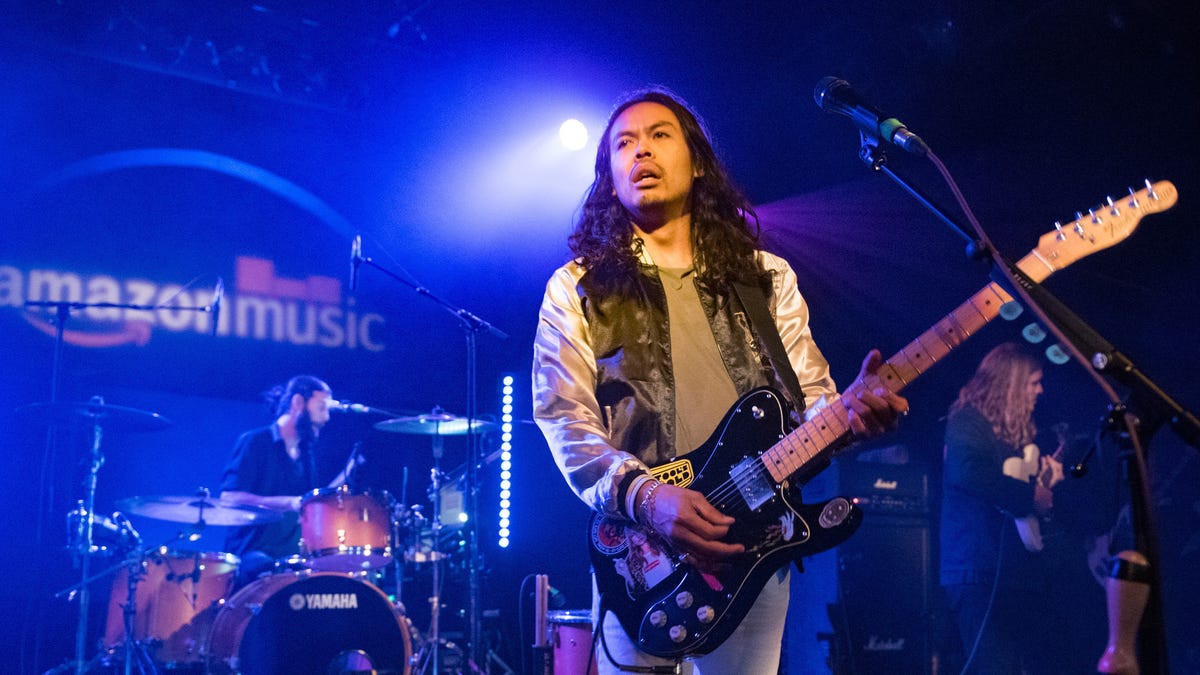What Amazon Music can do that rival streaming services can't
Amazon Music has a fraction of the songs of Spotify or Apple Music, but the service for "mainstream" fans says it offers other benefits.

If Spotify is too expensive and your tastes don't get much more adventurous than Coldplay, Amazon Music wants to be the music-streaming service for you. It might not have as many songs as rivals, but Amazon says you don't need them when you have the rest of Amazon Prime at your fingertips.
Launched in the US in 2014 and the UK in 2015, Amazon Music is the retail giant's streaming service that comes bundled with Amazon Prime. One year on from the British launch we caught up with Paul Firth, head of Amazon Music UK, to blow out the candles and find out how being part of the Amazon empire makes Amazon Music different from Spotify, Apple Music and other streaming services.
Amazon Music is a "mainstream music-streaming service for the mainstream music fan," said Firth. The most popular artists streamed on Amazon Music UK are Coldplay and Ed Sheeran along with classic artists like the Beatles and Fleetwood
Amazon Music UK's Paul Firth says being part of Amazon's wider retail ecosystem benefits subscribers and musicians.
Firth reckons these casual fans aren't put off by the relative paucity of Amazon's catalogue of 1 million songs. "We sell all of those [tracks] through our MP3 store," he said, "and we know the vast majority of them don't sell."
Spotify, the largest subscription music service, offers 30 million tracks but admits that millions have never been played.
Firth pointed out that although the music-streaming service itself is relatively young, Amazon has been selling people music for years as CDs and MP3s. "We know what [customer] tastes are and what they buy," he said. "Very few of them spend the £120 a year it would require to subscribe to a typical music-streaming service.
"In fact over 70 percent of them spend less than £30 a year," he said.
Spotify, Apple Music and Tidal all cost $9.99 per month, which works out to about $120 per year. Amazon Prime costs $99 per year in the US and £79 in the UK.
Being part of the established Amazon empire also gives the streaming service a head start in personalising your music. "If you've bought CDs or MP3s from us in the past 10 years," explained Firth, "that gives us a lot of history beyond just your first stream. That allows us to tailor things for you early on."
Amazon's wider retail ecosystem also benefits artists and record labels. In a music industry struggling to make money from actual music, that diversified revenue stream is hugely attractive.
Firth highlighted Coldplay's album "A Head Full of Dreams," the most popular long-player in Amazon Music's first year in the UK. "What Amazon can do for any band," he said, "is offer them the ability to reach their fans through any medium they want. We can sell your vinyl, we can sell your CDs, we can sell your MP3s."
Coldplay perform "A Head Full of Dreams" in New Jersey.
And it doesn't stop there. "We could be selling the book, the T-shirt, the DVD all in one place...With Coldplay we offered a ticket offer so customers who preordered [the album] had 24-hour priority access to [buy tickets for the band's] tour.
"When you can bring all that together then you're able to offer something to the industry, to artists, to labels that others can't," he said. Indeed, "A Head Full of Dreams" was conspicuous by its absence from Spotify on the first day of release. (It's now available on the streaming service.)
Tidal, Apple Music and Spotify have been criticised by stars including Adele, Taylor Swift and Thom Yorke about the meagre royalties trickling back from streaming services. Firth noted "Prime Music is a different model than the other streaming services out there, so it's a different sort of deal," and suggested, "it's the record labels and publishers who pay the artists."
He doesn't see Amazon being drawn into the arms race of big-name exclusives being waged by Tidal and Apple Music with new music from the likes of Kanye West and Drake. So far, Amazon Music has only dipped its toes in the water by funding a handful of specially recorded songs by popular artists for themed playlists.
"Never say never," said Firth of possible artist or album exclusives, "but right now our focus is on playlists."
When it comes to growth, Tidal and Spotify must recruit customers from scratch but Amazon Music already has a large pool of Prime subscribers who've paid for the service. A Prime subscription includes Amazon Music along with video streaming, Kindle e-books, cloud storage and unlimited two-day free shipping. Firth acknowledged many subscribers have yet to use all the benefits they're entitled to.
With this huge potential user base first priority, he downplays rumours the music service might follow the example of Amazon Video and break out from Prime.
"That potential user base who are already paying for Prime can be encouraged through their existing accounts to try out services like music streaming," he said, "a benefit that might be lost if the music service was separated out."

